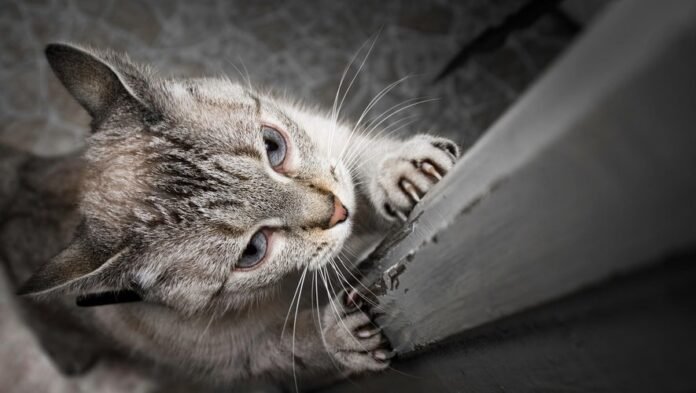Since being invited into our homes, cats have adopted their habits. One of them is to scratch sofas and other expensive furniture that catches their attention. But this is not inevitable: owners can control this behavior, according to a study published in the journal Frontiers in Veterinary Science.
For a cat, scratching is a natural action that fulfills several needs. Scratching surrounding furniture allows it to leave its scent mark over foreign odors, which it detects through its sense of smell, thereby marking its territory. However, this behavior is not always perceived as such by their owners, who see it as a destructive impulse.
This misunderstanding prompted an international research team to investigate the factors that influence this behavior in domestic cats. To do this, they asked more than 1,200 cat owners living in France about their little companions’ daily lives, as well as the characteristics and frequency of their scratches. Researchers have noted a link between certain environmental/behavioral factors and increased scratching behavior in cats.
The presence of small children in the home is one of them. Cats are more likely to scratch when they are around small children on a daily basis and their presence is a source of stress for them. The same phenomenon is observed in felines that were overstimulated during a play session with their owner. Scratching objects allows them to calm down and relieve bodily tension associated with stress.
Nocturnal hyperactivity
Nocturnal hyperactivity also affects scratching behavior. Cats that are very active after dark often frolic in the furniture around them.
The cat’s personality also has a lot to do with it. It is not surprising that aggressive or turbulent felines are more likely to scratch sofas, carpets and other indoor furniture.
If aggravating factors, such as the cat’s personality or the presence of small children, cannot be changed, others can be adjusted. It is thus possible to place a cat tree or a scratching post in areas of the house where cats feel more relaxed and less stressed. “Providing safe hiding places, high vantage points and plenty of opportunities to play can also help reduce stress and encourage the cat to engage in more constructive activities.”explains Yasemin Salgirli Demirbas, co-author of the study, in a press release shared by the Phys.org website.
It is important to remember that play is very beneficial for a cat’s health. This is how he expresses his natural hunting instincts. Organizing regular play sessions helps stimulate indoor cats’ predatory behavior and channel their energy. In this way, you minimize the risk of your furball attacking your furniture and other expensive things, and you strengthen the bonds between you.
